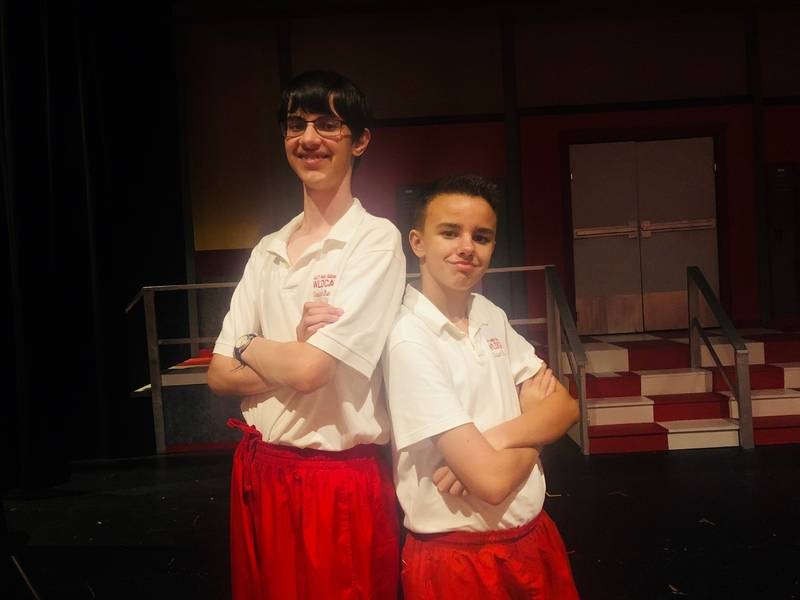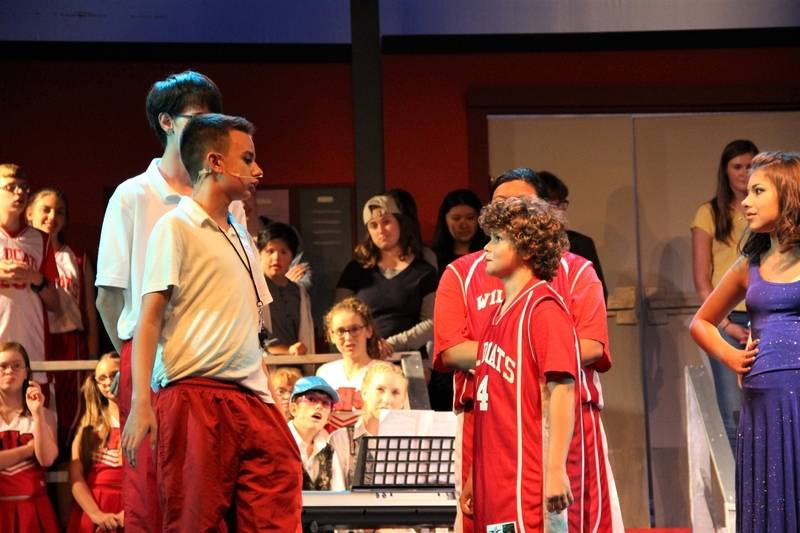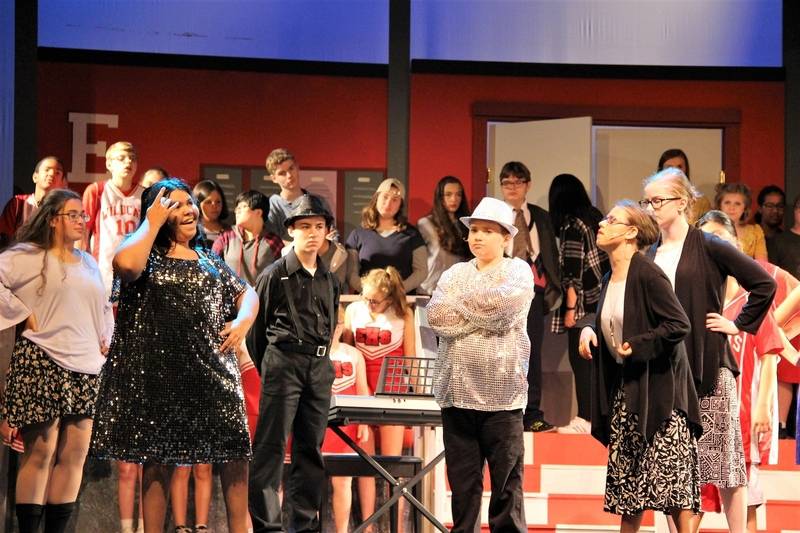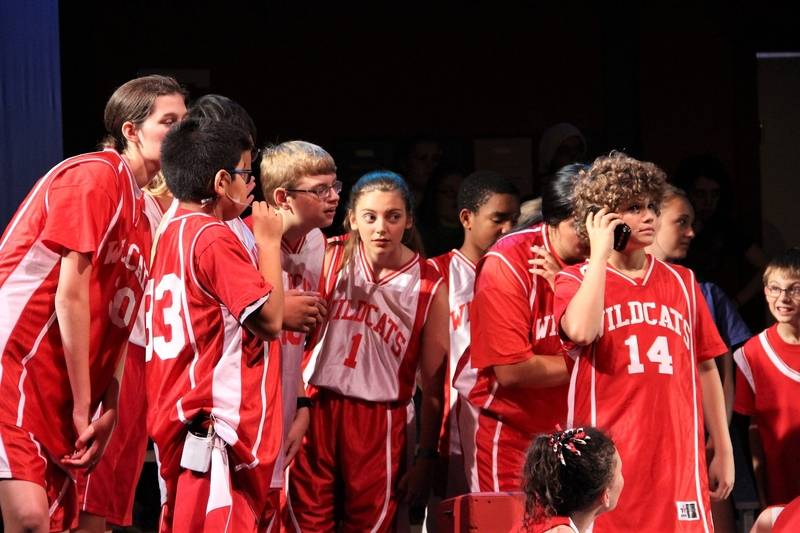Tonight is opening night of High School Musical Jr. at Urbana High School. Throughout the week the actors have been polishing up their performances at dress rehearsals — getting a feel for staging, putting on full costume and make-up — doing all of the things a cast does when preparing for a show. This particular show is not your typical musical theater performance, however. It is part of Champaign-Urbana Theater Company’s The Penguin Project, a program that “provides a supportive environment for children with disabilities to explore their creative talents.” All of the roles are filled by local youth and young adults who have a range of developmental and physical disabilities. This will be the 3rd year of The Penguin Project here in Champaign-Urbana; it was initally started in 2004 by Dr. Andrew Morgan of Peoria, IL. It now has 17 chapters nationally.
Kelly Nowlin, the executive director of CUTC, first learned of the project in 2013. She says, “the program immediately caught my attention because my two sons have very mild cerebral palsy. Speech contest and their participation in theatre and the people involved really helped them find their voice and develop who they are. I’ve seen the benefits first hand and knew there was a need.” Once she began working for CUTC in October of 2015, she decided to bring the Penguin Project to C-U.
The first year there were 27 artists, the largest number to turn out for a 1st year chapter, so the need was apparent, and it has grown each year. As an inclusive program, there are no traditional auditions, and there are no cuts. This year everyone who signed up before the deadline was able to participate. According to Nowlin, “not everyone has a speaking part or a solo, but everyone has a role.” Each performer is assigned a peer mentor — a student without a disability, who is close in age — that works alongside them throughout the rehearsals and performances. In this year’s show there are a combined total of 68 artists and mentors.
“We have a mentor coordinator and an assistant mentor coordinator who do a phenomenal job of helping the pairing process along and serve as liaisons between parents, other staff, artists, and mentors,” says Nowlin. “There are lots of factors involved. Parents will often let our coordinators know their artist might respond better to a more outgoing or quiet personality. Sometimes decisions are based on the theatrical experience of a mentor and the level of support an artist might need for a role. However, the relationship between the artists and mentors outweighs most everything else. Ideally, it is an organic process, and the kids choose each other.”

Franklin Middle School 8th grader Brody Van Camp (right) and his mentor Payne, a senior from Monticello, are paired up for this performance. This is Brody’s third time performing in the Penguin Project, and though he says his favorite show was Aladdin Jr., he seemed pretty psyched about showing off his angry side as Coach Bolton in High School Musical, “because Troy Bolton (the coach’s son) likes to sing, and not play basketball.” This is Payne’s first outing as a mentor. “It’s really cool working with Brody,” he said, “he had all of his lines memorized right way.”

Since there are a wide range of abilities and needs, there are a few added accommodations for the artists: Dances are choreographed in a way that helps them to remember lyrics, sometimes props might be used to conceal a part of the script they need to remember, or the lines of one character might be split between two artists to make it less overwhelming. In addition, the mentors are on stage the entire time to assist with prompts, blocking, and any other guidance needed. However, Dr. Morgan has always advocated for “setting the bar high and allowing students to rise to the occasion,” says Nowlin. “The Penguin Project demonstrates what students can do regardless of a disability when given a chance.”

It’s not a secret that participation in the arts is beneficial to all young people — brain development, self-confidence, working with others — but for these performers who may not have as many opportunities as their peers in mainstream settings, the impact of The Penguin Project goes even further. Barbra King, whose daughter Tovah has participated all three years, has seen the impact first hand. “Watching five similar aged siblings participate in all sorts of activities was a challenge for Tovah, and made her feel limited by her disabilities. Being part of ‘Penguin’ allows her to push past those limits.” Nowlin has seen the benefits as well. “Our artists develop confidence, become more independent, and develop social skills through the process. The relationships formed between the artists and mentors is really special. Several of them spend time together outside of rehearsals and have become really good friends. Parents and teachers have told us they attribute the Penguin Project to improved reading skills and test scores at school. Mentors often develop their soft skills through the experience: motivation, communication, problem-solving, teamwork, etc.”
The positive outcomes for the mentors go beyond the teamwork and communication skills, and veer into character development as well. As they work with and become friends with their mentees, they develop more empathy towards those who are differently-abled. According to Nowlin, “a few of our mentors have decided to pursue careers in special education as a result of their experience with Penguin Project.”
Even though this year’s show is just getting ready to open, Nowlin is thinking about the future of the program. “I’m a dreamer, and I would love to have our own state-of-the-art accessible theatre so that we could do more programming. We can’t get too much bigger right now because of lack of space to rehearse and perform.” She also hopes that performing in Penguin Project productions will be a springboard for some of the artists to become involved in the broader theatre scene. “We have some very talented artists, and I hope they will be able to continue their involvement in community theatre for their entire life.”
As the performers were starting to head to the stage for their rehearsal, I asked Brody if he felt ready for the show. His response?
“I was born ready.”
High School Musical, Jr.
Urbana High School Theatre
1002 S. Race
Urbana
September 21-22 7 p.m., September 23rd 2 p.m.
Tickets available here.
Dress rehearsal photos provided by Autumn Nagele. Photo of Brody and Payne by Julie McClure.








